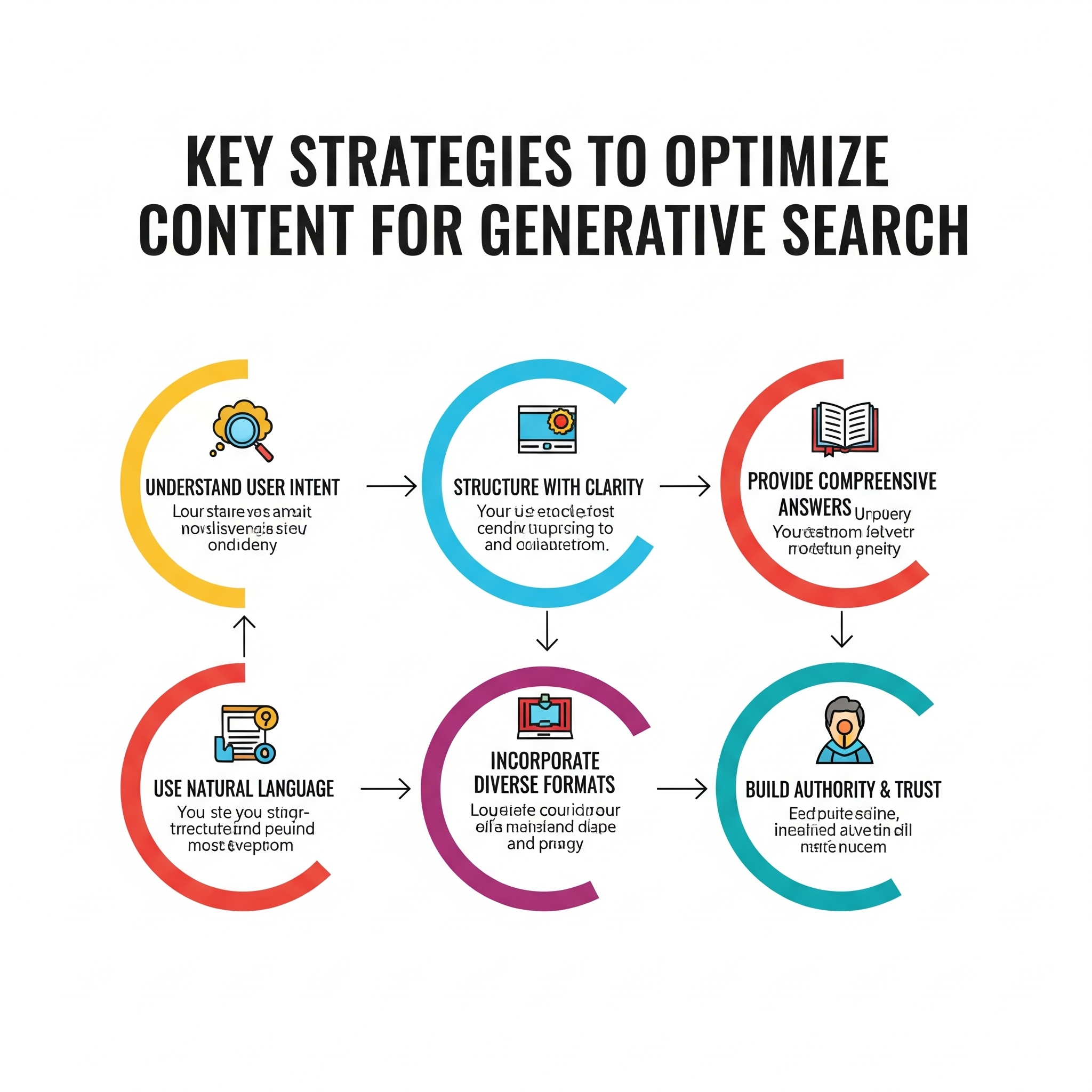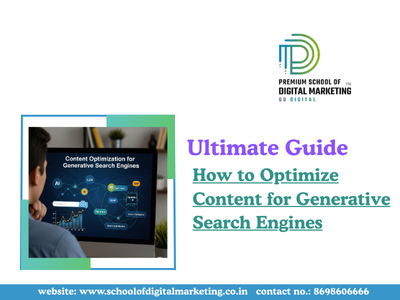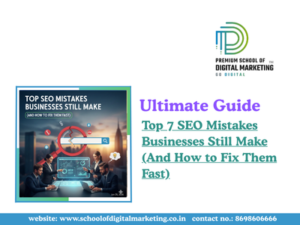Table of Contents
How to Optimize Content for Generative Search Engines
Introduction
These days, searching for information goes way beyond just using traditional search engines. With the emergence of AI-driven platforms like generative search integrations, AI summaries, and conversational assistants, users are now looking for quick, straightforward, and natural responses.
This evolution has led to the concept of Generative Engine Optimization (GEO)—a fresh approach that takes things further than conventional SEO. In this blog, we’ll dive into how to fine-tune your content for generative search engines, why it’s important, and provide you with step-by-step strategies to keep you ahead in the ever-changing digital world.
What is Generative Engine Optimization (GEO)?
Generative Engine Optimization (GEO) involves organizing and presenting your content in a way that AI systems can easily grasp, summarize, and showcase it in generative results. The key components of GEO include:
Clarity – Clear, concise paragraphs that directly address questions.
Structure – Thoughtful use of headings, FAQs, bullet points, and tables.
Authority – Incorporating reliable data, up-to-date information, and trust signals.
Why Optimizing for Generative Search Matters
✅ User behavior is changing – Nowadays, people are more inclined to ask questions in a conversational tone, using full sentences rather than just short keywords.
✅ AI citations enhance credibility – When content is featured in generative results, it helps to build trust and authority with the audience.
✅ Future-proofing your strategy – Companies that embrace Generative Search Optimization (GEO) early on will have a competitive edge.
You May Also Like To Read : Is AI Replacing Digital Marketers? Here’s the Truth You Need to Know
Key Strategies to Optimize Content for Generative Search

1.Focus on Structure and Clarity
- Generative systems Favor content that’s easy to read and navigate.
- Insights from various industry experts suggest: Utilize clear H2 and H3 subheadings that align with what users are searching for.
- Keep paragraphs concise, ideally focusing on one main idea at a time.
- Incorporate lists, bullet points, and tables to present information clearly.
- Start with straightforward answers, then delve into more detailed explanations.
2.Build Depth and Authority
- AI tends to Favor content that showcases expertise and thoroughness.
- To accomplish this: Explore related subtopics and address multiple user inquiries.
- Include unique insights, such as personal anecdotes, examples, or original data. Highlight practical expertise—share real-world applications or outcomes.
- Make sure to regularly update your content with the latest information.
3. Emphasize Natural Language and Semantics
Since generative search is all about natural language processing, here’s how to make your writing shine: –
- Write in a friendly, conversational tone, as if you’re chatting directly with the reader.
- Use semantic keywords and their variations in a way that feels natural.
- Steer clear of robotic keyword stuffing
- Focus on making your text flow smoothly and be easy to read.
- Keep your content fresh by updating it regularly with the latest statistics to stay relevant.
Don’t Miss Out – Register for the Free Demo
4. Strengthen Technical Optimization
It’s not just about the words; technical signals play a big role too. Here are some best practices to follow:
- Incorporate structured data markup like FAQ and How To schema to enhance your content.
- Make sure your site loads quickly and is mobile-friendly.
- Use clean HTML tags and provide descriptive ALT text for your images.
- Ensure your content is crawlable so that AI can easily access and understand it.
5.Build Topical Authority with Internal Linking
AI tools tend to Favor sites that demonstrate consistent expertise in their domain. Here’s how you can build that authority:
- Create topic clusters by writing multiple in-depth articles on related themes.
- Interlink your related blogs to showcase your authority in a specific niche.
- Think ahead about conversational search phrases and weave them into your content naturally.
Example: SEO vs GEO at a Glance
| Aspect | SEO (Traditional) | GEO (Generative Engine Optimization) |
| Focus | Keywords, backlinks, rankings | Context, clarity, AI readability |
| Style | Keyword-dense long-form blogs | Conversational, structured with FAQs & lists |
| Goal | Rank higher on search pages | Get cited in generative AI answers |
About School of Digital Marketing (SDM)
The School of Digital Marketing (SDM) stands out as one of India’s most reputable training institutes, dedicated to helping learners forge successful careers in digital marketing. Practical, Industry-Relevant Courses – Covering SEO, GEO, SEM, and AI search optimization.
- Expert-Led Training – Learn from seasoned professionals with real-world experience.
- Hands-On Projects – Engage in real assignments and case studies for practical learning.
- Career Support – Benefit from resume building, mock interviews, and job assistance.
- Recognized Institute – Acknowledged nationwide for providing top-notch digital marketing education.
- Beginner to Advanced Programs – Courses designed for students, professionals, and entrepreneurs alike. With SDM, you’re not just gaining knowledge; you’re building the confidence to thrive in the AI-driven digital age.
You May Also Like To Read : Why Every Digital Marketer Needs to Learn AI in 2025
Conclusion
Generative search is transforming the world of digital marketing. To keep up in this competitive landscape, businesses and creators need to optimize for GEO by prioritizing structure, clarity, authority, and natural language. Those who embrace these changes will not only retain their visibility but also establish themselves as trusted sources featured in AI-generated responses.
FAQs on Generative Engine Optimization (GEO)
Q1. What is GEO in digital marketing?
GEO stands for Generative Engine Optimization, which is all about fine-tuning your content so that AI-powered search engines can easily grasp it and showcase it in their responses.
Q2. How is GEO different from SEO?
While SEO focuses on climbing the ranks in traditional search results, GEO is all about making sure your content shines in AI-driven conversational answers.
Q3. Why is GEO important for businesses?
As AI tools become the go-to method for searching, GEO helps businesses gain better visibility, build brand trust, and drive more traffic.
Q5. How often should content be updated for GEO?
To keep up with GEO, it’s essential to update your content regularly—this means adding fresh statistics, updating examples, and staying in tune with the latest AI search trends.






